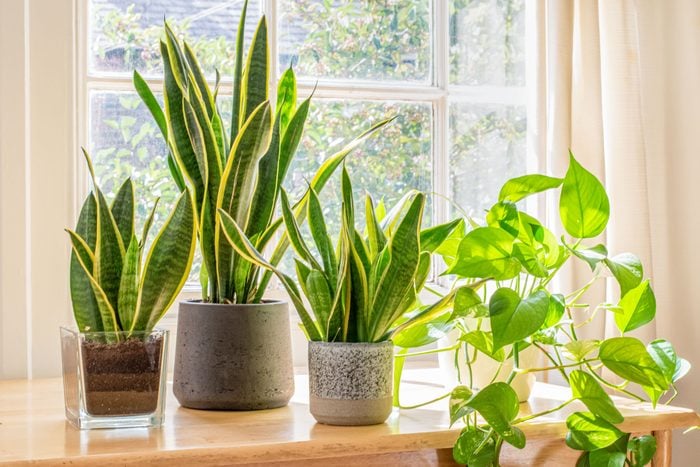
Feng shui flora
An ancient Chinese practice, feng shui is all about cultivating spaces so the energy of the person living there can thrive. This means the positioning of furniture and even indoor plants matter when creating a flow of harmony that matches the natural order of the world. And according to feng shui experts, there are certain good luck plants that are believed to naturally attract good energy into the space.
Depending on the plant you choose, you can bring different kinds of luck into your life and into your home, says feng shui consultant and author Carole Hyder. The lucky bamboo plant, for instance, can attract financial luck, while others are known to bring romance, harmony and health. If you are seeking more good luck, celebrating the Chinese New Year, acquiring good luck charms or staying away from unlucky things, consider also adding good luck plants to your home.
An important note about good luck plants
They need to be well cared for. Obviously, a wilted plant won’t bring your space good luck or clean air. In fact, a dying plant may even cultivate bad luck because it drains the space of energy. Every plant needs water and sunlight to thrive, but the amount varies, so continue reading to learn which good luck plants might best fit your lifestyle and location year around.
Get Reader’s Digest’s Read Up newsletter for plants, humor, cleaning, travel, tech and fun facts all week long.
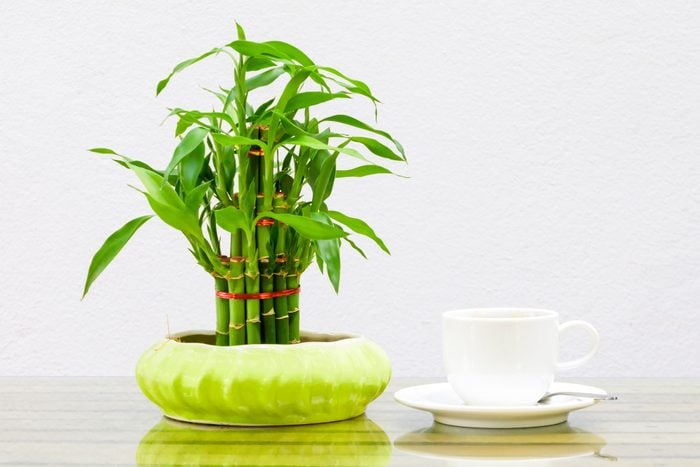
Bamboo
Type of luck: Wealth and good fortune
“Bamboo is known for its durability and resilience through all the seasons,” Hyder says. Because it never loses its leaves, the lucky bamboo plant symbolizes courage in the midst of adversity. Providing strength and support, this is one of a few good luck plants that can bring about wealth and fortune.
To attract the most luck, keep the bamboo plant on a highly visible surface. Many realtors will place the plant on a living room coffee table during open houses. It’s an easy-to-care-for plant, and because bamboo only requires daylight and simple plant watering instructions, it can be placed anywhere in a house where you might need a bit more luck, including an office.
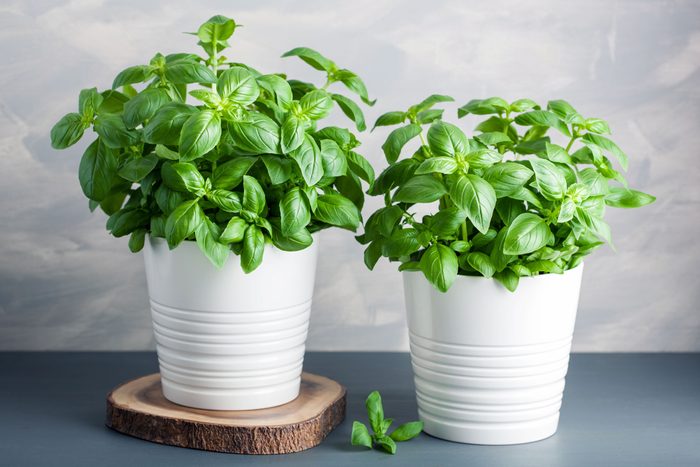
Basil
Type of luck: Health
Do you love to cook at home? Basil, a symbol of general fortune and health, is one of the most popular herbs to grow. According to holistic herbal medicine, basil leaves can treat colds, inflammation and blood circulation. Because of this, the basil plant is believed to ward off bad energies.
This good luck plant is one that needs a lot of sunlight and water. And since it’s most often used in cooking, you’ll want to place it in your kitchen or dining area—and learn how to properly store fresh herbs for maximum freshness.
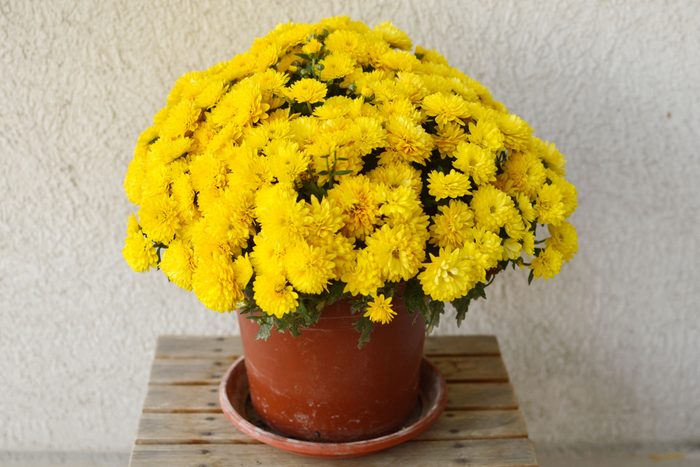
Chrysanthemum
Type of luck: Longevity
“The chrysanthemum flower blooms in late autumn and early winter, making it an emblem of longevity,” Hyder says. Chrysanthemums, especially yellow ones that resemble the sun, can also bring happiness into a home. Which means this good luck plant not only symbolizes a long life, but also longevity in health, happiness and harmony.
Although often used as a cut flower placed in a vase, this plant can be grown indoors. You will want to find a potted plant if you intend to grow it in your home. Chrysanthemums, like their sunny disposition, require warmth and regular watering.
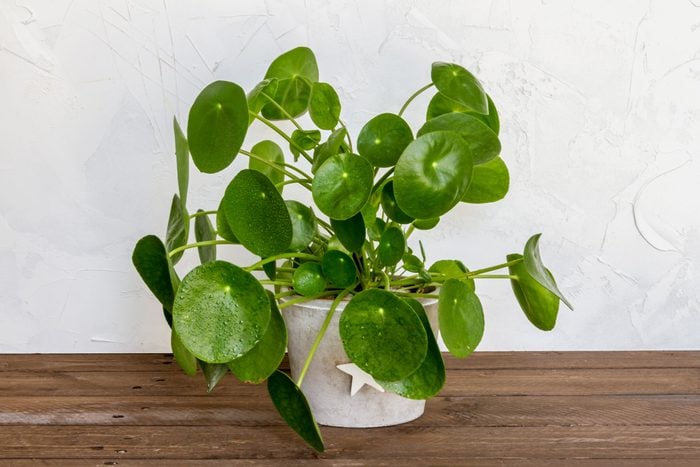
Chinese money plant
Type of luck: Money
Pilea peperomioides, most frequently known as the Chinese money plant, is one of the most potent good luck plants when it comes to financial wealth. Also known as the UFO plant or coin plant, Hyder says this small indoor plant has “not only round coin-like leaves but also creates offshoots representing more ways to bring in financial success.”
Unlike other sun-loving plants, the Chinese money plant needs indirect sunlight. You should allow the plant’s soil to dry out before watering well about once a week. Although the plant can flower outdoors, you should not expect the plant to produce flowers indoors.
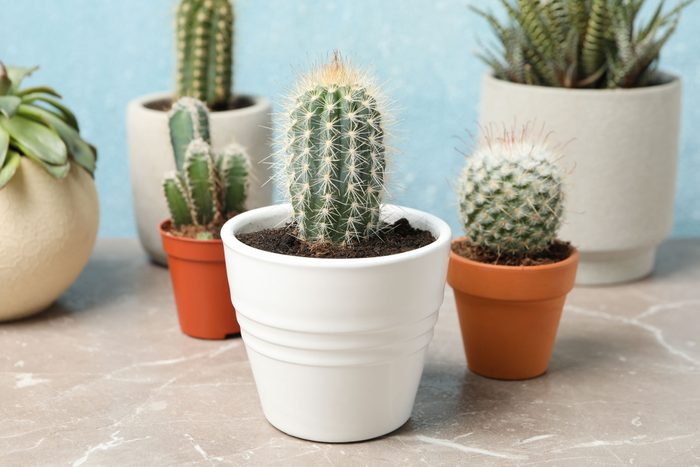
Cactus
Type of luck: Boundary setting
In feng shui, the cactus, a type of succulent, can be a controversial plant to incorporate into a household, Hyder says. The plant’s prickly spines can feel aggressive and dangerous. Many feng shui experts would argue against putting a cactus in one’s home at all, especially in a bedroom, because those sleeping in that room may adopt the prickly attitude. Nevertheless, the cactus is a popular houseplant because it comes in many varieties and succulent plant care is generally easy.
The cactus can also represent the importance of setting boundaries, says Hyder. The placement of a cactus plant should be subtle, such as next to a cabinet if it is larger or on a bookshelf if the plant is on the smaller side. The cactus can also absorb argumentative energies, but if you begin to feel nervous or irritable, check the placement of your cactus plant.
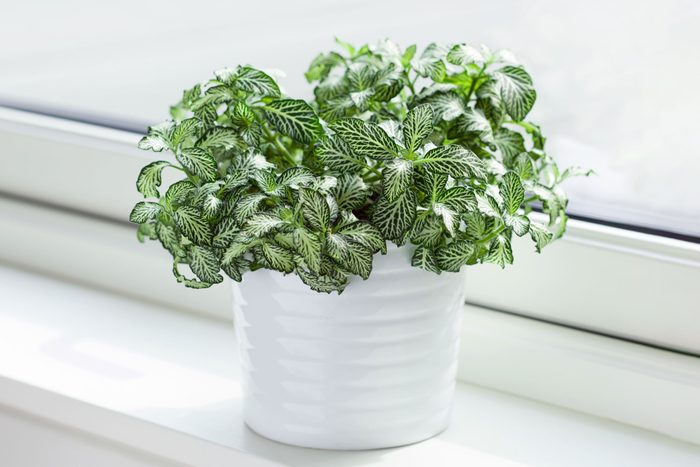
Fittonia
Type of luck: Offsets negative energy
Fittonia, or nerve plants, are known for their vibrant pink or white veins that stand out on dark leaves. Aside from their eye-catching nature, this is one of those good luck plants that represents growth and renewal. Although small, these plants radiate good energy and can offset the negative energy that collects in less-used spaces. This tropical plant is best suited for a terrarium or a bathroom with indirect sunlight, and is an overall low-light indoor plant that does require frequent watering.
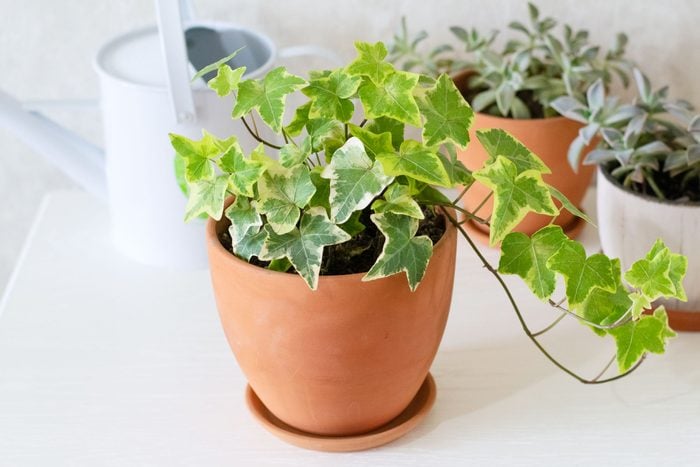
Ivy
Type of luck: Restoration
Ivy is a great air filter plant, which is why you may see it at your local coffee shops. More than that, Hyder highlights that the ivy plant represents “friendship and patience because it attaches itself securely to objects.” In addition, this good luck plant brings happiness, positivity and restorative energy.
Super low maintenance, ivy can sustain itself in dark places, which makes it a great plant for areas that receive very little energy flow. Ivy can revive spaces, such as the tops of cabinets and hard-to-reach corners that restrict your living space’s positivity.
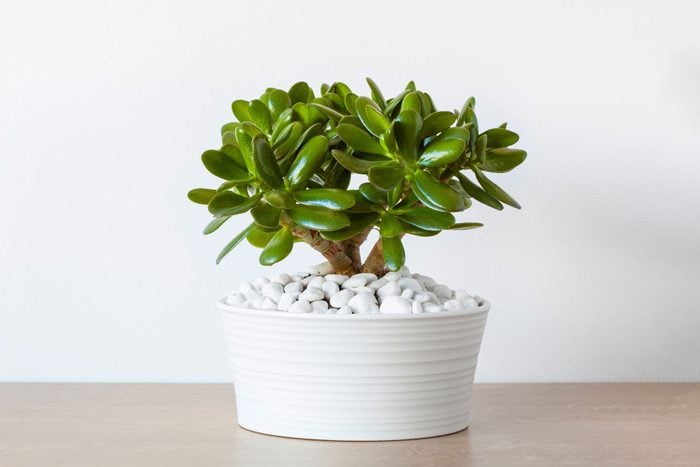
Jade
Type of luck: Financial success
A great addition to your home office, the jade plant is often considered the money plant, and that is because “its leaves are round, resembling coins,” says Hyder. “When it eventually blooms, the belief is that money will begin to flow into the household.”
This good luck plant requires a lot of sunlight but not too much watering. Moreover, the color of its leaves can indicate the air quality of the room, with green being healthy and yellow being less so.
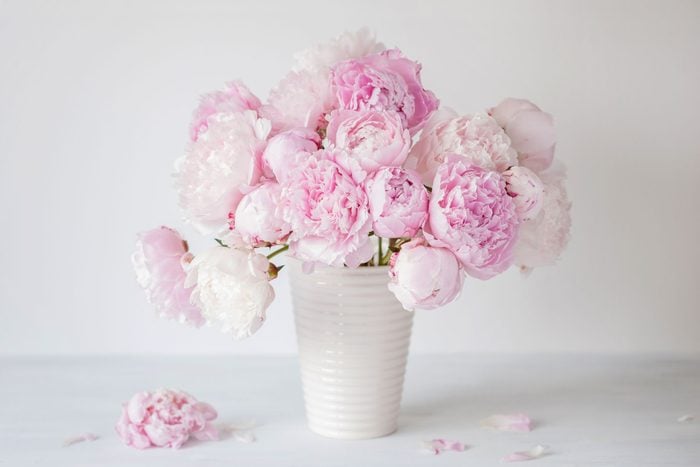
Peony
Type of luck: Love and healing
Known as the king of flowers in China, the peony is, according to Hyder, a symbol of prosperity and nobility. Flowers are especially meaningful because of their beauty and because in nature, they offer a fragrant smell and sustenance in the form of nectar. Mirroring its natural state, peonies in particular bring beauty, love and healing—the meaning behind the flower’s name, after all, comes from Paeon, the Greek physician of the gods.
The yellow and purple varieties are considered to have the highest value because of the colors’ association with royalty. And while you might think that peonies can only be grown outside, smaller varieties of the plant, such as the Chinese peony, can be grown indoors—it’ll just need a space at least one foot wide and one foot deep. These plants tend to thrive in cool temperatures with at least five hours of direct sunlight.
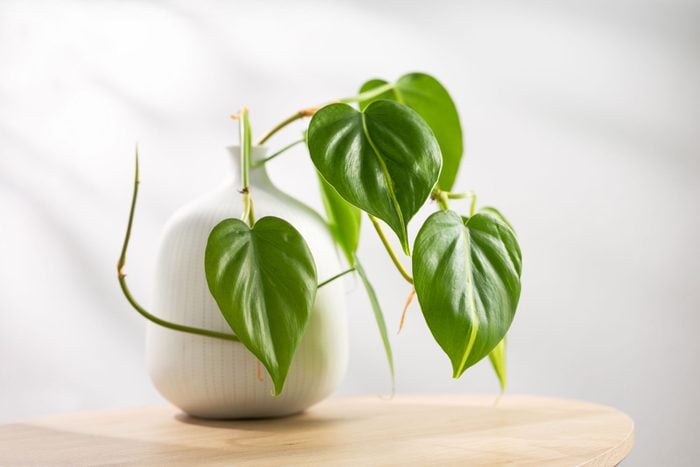
Philodendron
Type of luck: Inspiration
With its heart-shaped leaves, the philodendron can bring a fiery passion into your house—feng shui experts believe it symbolizes the fire element. This good luck plant grows well in dark corners and is a great hanging plant. And if you’re in need of innovation, creativity or ingenuity, it’s the perfect plant to bring into a studio space or office when the energy is low or inspiration has run dry.
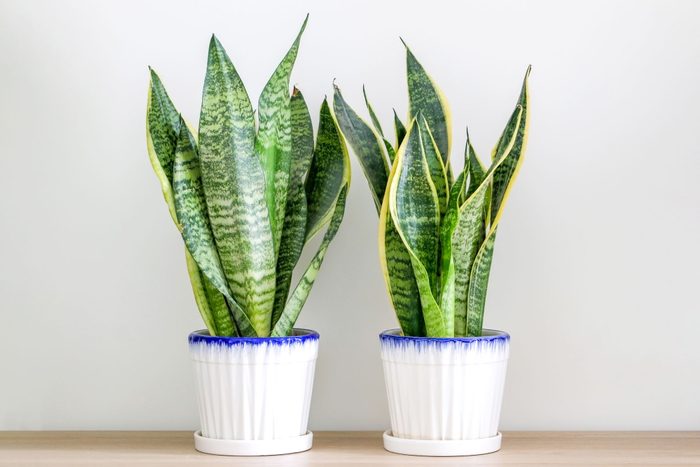
Mother-in-law’s tongue
Type of luck: Protection
Also called a snake plant for its slick-looking upward leaves, mother-in-law’s tongue brings strong protective energies. In terms of placement, “a mother-in-law’s tongue plant works best near the front door,” says Hyder. While its sharp edges are not suitable for a bedroom, they could work in a sitting room where outsiders are invited into your home. The mother-in-law’s tongue plant is a hardy plant that requires very little maintenance and should only be watered sporadically.
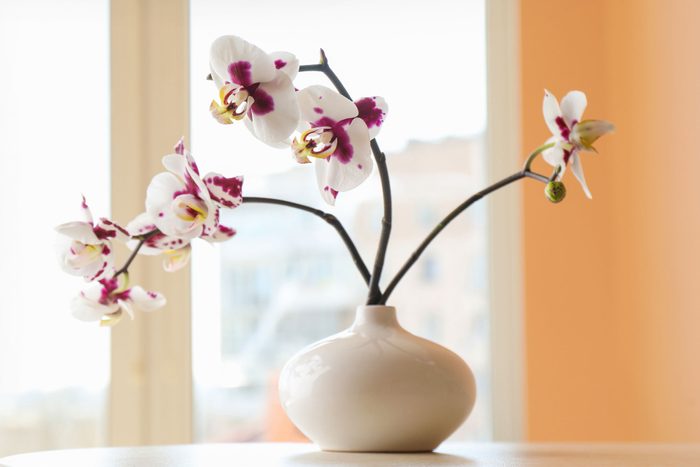
Orchid
Type of luck: Healthy relationships
Orchids are known for their beauty and elegance, which is why many orchid lovers enjoy a life of luxury. Confucius even made remarks about its exquisite characteristics, including its unique petal formations, which made the flower even more popular in China, says Hyder. Symbolically, this flowering plant is indicative of new beginnings and blessings. Similarly, according to feng shui principles, it can bring about romance and fertility.
With their long stems and long-lasting blooms, they can cultivate a stable and loving relationship. It is important to keep the orchid out of direct sunlight and to water when the soil dries. Between blooms, the plant may be less appealing to look at, but even in this stage, this good luck plant replicates the patience needed to sustain a healthy relationship.
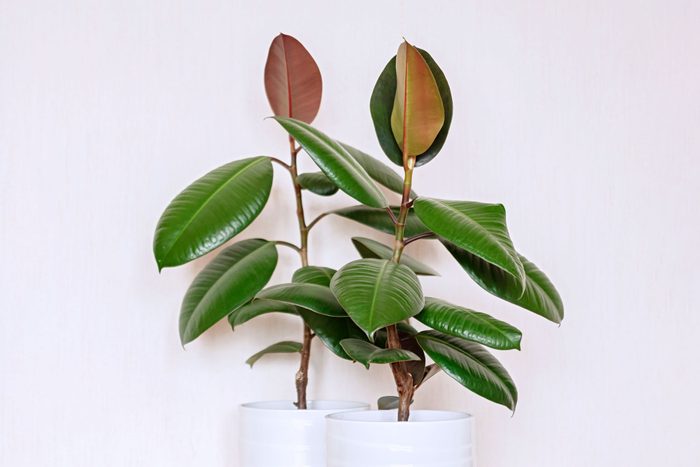
Rubber tree
Type of luck: Money and happiness
The rubber tree is a tall indoor plant with dark green leaves that brings abundance, happiness and wealth. Placing a rubber tree in a corner is a great choice, notes Hyder, as the rounded leaves can offset the harshness of the sharp angle. The perfect corner is a southeast corner, as this direction governs wealth, according to feng shui. With proper care, the plant grows tall, “adding an element of majesty and gentleness.” Water every one to two weeks and provide around seven hours of indirect sunlight.
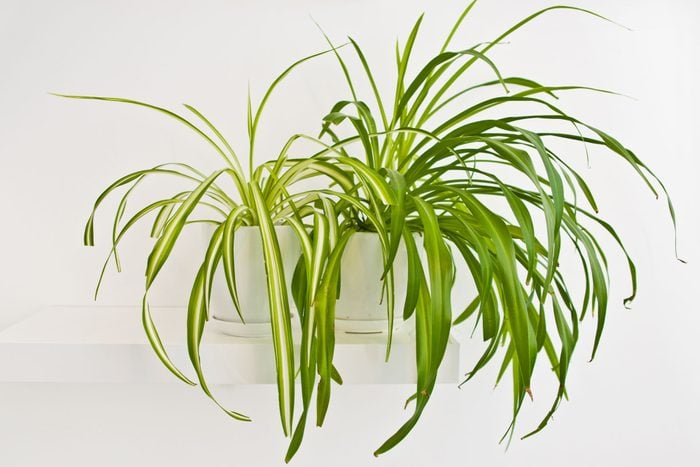
Spider plant
Type of luck: Stability
With its ribbon-like appearance, the spider plant is believed to bring good luck with its naturally strong and long leaves. The leaves of the plant represent growth, while its white flowers are a symbol of purity. The plant as a whole is believed to bring about a long life and stability. It’s also an indoor plant known to remove toxins from the air, and caring for this spider plant is simple.
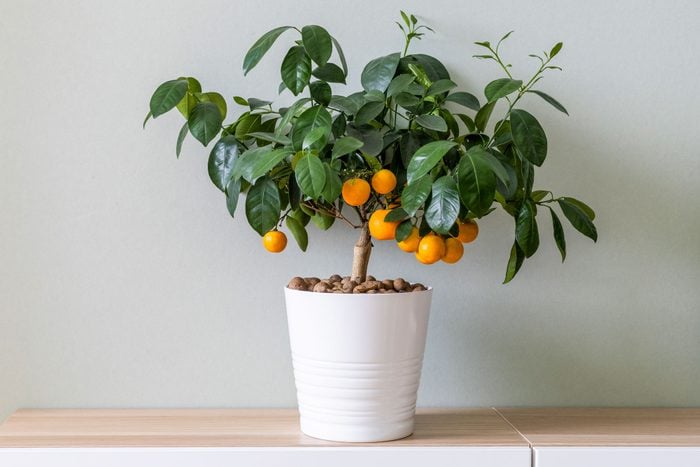
Tangerine tree
Type of luck: Wealth
Bringing wealth and peace, a tangerine tree might be the perfect choice for those with more space in their homes. The fruit from this good luck plant, Hyder points out, almost resembles gold coins hanging on a tree.
A gifted tangerine tree should never be refused, Hyder says, because in doing so, the recipient is essentially turning away luck and abundance. These indoor fruit trees should be kept in temperate conditions, not too hot and not too cold, with at least four hours of sunlight, and watered once a week.
About the expert
- Carole J. Hyder is an expert consultant, speaker, teacher and author in the field of feng shui. In her work, she combines ancient practices with modern research to create superior environments.
